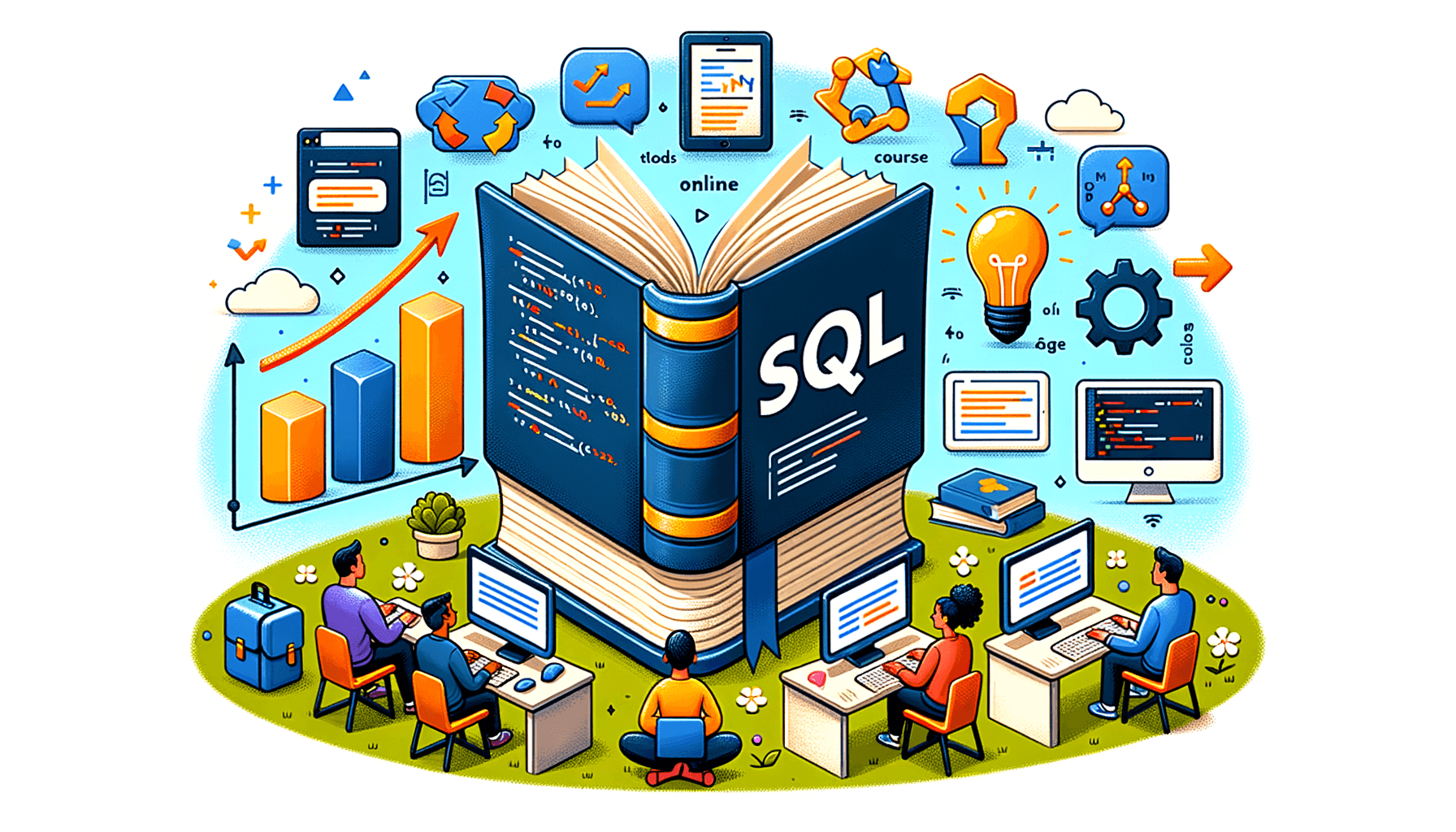A big variety of articles and resources

What is the best beginners way of learning SQL?
 Sia Author and Instructor
Learn SQL
Sia Author and Instructor
Learn SQL
14 minute read
Learning SQL can seem like a big task, especially if you're new to databases. SQL is a key skill in many tech jobs and is used for managing and querying data. This guide will help beginners understand the best ways to start learning SQL, from understanding its importance to finding the right resources and practicing your skills.
Key Takeaways
- SQL is essential for managing and querying data in many tech jobs.
- Start with basic concepts like SQL syntax, databases, and data types.
- Use books, online tutorials, and interactive courses to learn SQL.
- Hands-on practice with sample databases is crucial for mastering SQL.
- Joining communities and forums can provide extra support and learning opportunities.
Understanding the Importance of SQL in Data Management
Role of SQL in Modern Databases
SQL is the backbone of modern databases, enabling us to store, retrieve, and manipulate data efficiently. Without SQL, managing large datasets would be nearly impossible. It provides a standardized way to interact with databases, ensuring data integrity and security.
SQL vs. Other Query Languages
While there are other query languages, SQL remains the most widely used due to its simplicity and effectiveness. Unlike some alternatives, SQL is universally accepted and supported by most database systems, making it a versatile tool for data management.
Industry Demand for SQL Skills
The demand for SQL skills in the industry is high. Many job roles, from data analysts to software developers, require a solid understanding of SQL. Mastering SQL can open doors to numerous career opportunities and is often a prerequisite for advanced data management roles.
Master SQL basics for beginners at your own pace. No credit card required. Login or sign up to start learning with SQLSkillz.
Getting Started with SQL: Essential Concepts
Basic SQL Syntax and Commands
When we begin learning SQL, understanding the basic syntax and commands is crucial. SQL commands like SELECT, INSERT, UPDATE, and DELETE form the foundation of database interactions. These commands allow us to retrieve and manipulate data efficiently.
Understanding Databases and Tables
Databases are organized collections of data, and tables are the structures within them that store this data. Each table consists of rows and columns, where rows represent records and columns represent the attributes of those records. Grasping this structure is essential for effective data management.
Introduction to Data Types
In SQL, data types define the kind of data that can be stored in a table's column. Common data types include integers, floating-point numbers, and strings. Knowing the appropriate data type for each column ensures data integrity and optimizes database performance.
A solid understanding of these essential concepts lays the groundwork for more advanced SQL topics and practical applications.
Choosing the Right Learning Resources
Books and Online Tutorials
Books and online tutorials are excellent starting points for learning SQL. They allow us to master the basics of SQL at our own pace. Websites like sqlskillz.com vs w3schools.com offer comprehensive guides that are perfect for beginners. These resources often include step-by-step instructions and examples to help us understand fundamental concepts.
Interactive Courses and Platforms
Interactive courses provide a more engaging way to learn SQL. Platforms like Codecademy and DataCamp offer hands-on exercises and real-time feedback. These courses are designed to be concise and straightforward, making it easy for us to grasp the essentials quickly. Additionally, many of these platforms offer free introductory lessons, so we can start learning without any financial commitment.
Community and Forum Support
Joining online communities and forums can be incredibly beneficial. These platforms allow us to ask questions, share knowledge, and learn from others' experiences. Websites like Stack Overflow and Reddit have active SQL communities where we can find answers to our queries and participate in discussions. Engaging with a community can provide us with additional support and motivation as we learn SQL.
Hands-On Practice: The Key to Mastery
Setting Up a Local SQL Environment
To truly understand SQL, we need to set up a local environment. This involves installing a database management system (DBMS) like MySQL or PostgreSQL on our computers. Having a local setup allows us to experiment freely without the risk of affecting live data. It's a safe space to learn and make mistakes.
Working with Sample Databases
Once our environment is ready, we can start working with sample databases. These databases are pre-populated with data, giving us a playground to practice writing queries. By solving real-world problems, we can see how SQL is used in various scenarios. This practical experience is invaluable for mastering SQL.
Participating in SQL Challenges and Exercises
To further hone our skills, we should participate in SQL challenges and exercises. Many online platforms offer these challenges, which range from beginner to advanced levels. They provide a structured way to practice and improve our SQL abilities. Engaging in these activities helps us apply what we've learned and prepares us for real-world applications.
Practical experience is crucial for mastering SQL. By setting up a local environment, working with sample databases, and participating in challenges, we can build a strong foundation in SQL.
Leveraging Online Courses for Structured Learning
Benefits of Guided Learning
Online courses offer a structured way to learn SQL, providing a clear path from beginner to advanced topics. Guided learning ensures that we cover all essential concepts without missing any critical steps. This method is particularly beneficial for those who prefer a systematic approach to learning.
Top Online SQL Courses for Beginners
There are numerous online platforms offering SQL courses, each with its unique strengths. Here are some of the top options:
- Jumpstart SQL: This free course is perfect for beginners, offering a quick introduction to databases with no prior experience required.
- SQL Essentials: Designed for IT students and new professionals, this course covers the basics of databases and table structures.
- Data Analyst Introduction to SQL: Aimed at aspiring data analysts, this course focuses on querying and analyzing data in real-world scenarios.
Evaluating Course Quality
When choosing an online SQL course, it's important to consider several factors to ensure you get the best learning experience:
- Course Content: Look for courses that cover a wide range of topics, from basic syntax to advanced queries.
- Instructor Expertise: Courses led by experienced instructors, like those specializing in performance optimization, can provide deeper insights.
- Hands-On Projects: Practical exercises and real-world problem-solving are crucial for mastering SQL.
- Student Support: Access to forums, community support, and expert guidance can significantly enhance your learning experience.
Mastering MySQL Performance and Query Optimization course offers practical SQL training with real-world problem-solving, hands-on projects, and expert-led instruction for career advancement in data management.
By leveraging these online resources, we can build a strong foundation in SQL and advance our skills efficiently.
Building a Strong Foundation with SQL Basics
Writing Simple Queries
When starting with SQL, writing simple queries is essential. These queries help us retrieve specific data from a database. For instance, using the SELECT statement, we can pull data from one or more tables. Mastering these basic queries is the first step toward becoming proficient in SQL.
Using Aggregate Functions
Aggregate functions like SUM, AVG, and COUNT allow us to perform calculations on multiple rows of data. These functions are crucial for summarizing data and generating reports. By understanding how to use these functions, we can quickly analyze large datasets and extract meaningful insights.
Understanding Joins and Relationships
Joins are used to combine data from multiple tables based on a related column. There are different types of joins, such as INNER JOIN, LEFT JOIN, and RIGHT JOIN. Learning how to use joins effectively enables us to create complex queries that provide a comprehensive view of the data. This skill is vital for any SQL user, as it allows us to understand the relationships between different data points.
Building a strong foundation in SQL basics is like laying the groundwork for a house. Without a solid base, it's challenging to build anything substantial. By focusing on simple queries, aggregate functions, and joins, we set ourselves up for success in more advanced SQL topics.
Applying SQL in Real-World Scenarios
Data Analysis and Reporting
In the realm of data analysis, SQL is indispensable. We can use SQL to extract meaningful insights from large datasets, enabling us to make informed decisions. For instance, by writing queries to filter and aggregate data, we can generate comprehensive reports that highlight key trends and metrics. This is particularly useful in business settings where data-driven decisions are crucial.
Database Management Tasks
SQL is also essential for managing databases effectively. Tasks such as creating, updating, and deleting records are all performed using SQL commands. Additionally, SQL allows us to maintain data integrity and optimize database performance. By regularly running maintenance queries, we can ensure that our databases remain efficient and reliable.
SQL in Web Development
In web development, SQL plays a critical role in backend operations. We use SQL to interact with databases, enabling dynamic content generation and user data management. For example, when a user logs into a website, SQL queries are executed to verify credentials and retrieve user information. This seamless integration of SQL in web development enhances the functionality and user experience of web applications.
SQL is a versatile tool that empowers us to handle various real-world scenarios, from data analysis to web development. By mastering SQL, we can unlock the full potential of our data and drive success in our projects.
Common Mistakes and How to Avoid Them
Syntax Errors and Debugging
One of the most common mistakes beginners make is syntax errors. These can be frustrating but are usually easy to fix. Always double-check your code for typos and missing elements like commas or semicolons. Using an SQL editor with syntax highlighting can help you spot errors quickly.
Efficient Query Writing
Writing efficient queries is crucial for performance. Avoid using SELECT * in your queries, as it can slow down your database. Instead, specify the columns you need. Additionally, use indexes wisely to speed up data retrieval.
Handling Large Datasets
Working with large datasets can be challenging. Make sure to use LIMIT clauses to restrict the number of rows returned, and consider breaking down complex queries into smaller, more manageable parts. This will help you avoid overwhelming your system and improve query performance.
Remember, practice makes perfect. The more you work with SQL, the more you'll understand how to avoid these common pitfalls.
Advancing Your SQL Skills
Exploring Advanced SQL Topics
Once we've mastered the basics, it's time to dive into more complex SQL topics. Advanced SQL includes concepts like window functions, subqueries, and common table expressions (CTEs). These tools allow us to perform more sophisticated data analysis and manipulation. Mastering these advanced topics can significantly enhance our ability to handle complex queries and large datasets.
Certifications and Further Education
Pursuing certifications can validate our SQL skills and make us more attractive to employers. Certifications from recognized organizations, such as Microsoft or Oracle, can open doors to new job opportunities. Additionally, further education through advanced courses or degrees can deepen our understanding and expertise in SQL and database management.
Career Paths for SQL Experts
SQL skills are highly valued in various career paths. Data analysts, database administrators, and software developers all benefit from strong SQL knowledge. By advancing our SQL skills, we can explore roles in data science, business intelligence, and even web development. The demand for SQL expertise continues to grow, making it a valuable asset in the job market.
Jumpstart SQL: Free Introductory Lessons provide a quick introduction to SQL for beginners, no experience needed. This course lays a foundation in database concepts, practical learning, hands-on projects, and expert-led training.
Utilizing SQL for Career Advancement
SQL in Data Science and Analytics
In the field of data science and analytics, SQL is a fundamental skill. It allows us to extract, manipulate, and analyze data efficiently. Mastering SQL can open doors to roles such as data analyst, data scientist, and business analyst. For instance, a data analyst might use SQL to query large datasets and generate reports that inform business decisions.
SQL for Business Intelligence
Business intelligence relies heavily on SQL for data retrieval and reporting. By understanding SQL, we can create complex queries that provide insights into business performance. This skill is crucial for roles like BI developer and BI analyst, where the ability to handle data effectively can lead to significant career growth.
SQL in Software Development
In software development, SQL is used to manage and interact with databases. Developers often need to write SQL queries to fetch data for applications or to ensure data integrity. Learning SQL can enhance our capabilities as software developers, making us more versatile and valuable in the tech industry.
SQL is not just a tool for data professionals; it's a versatile skill that can enhance our career prospects across various fields. By mastering SQL, we can unlock new opportunities and advance in our careers.
Maintaining and Improving Your SQL Knowledge
To stay current in the ever-evolving field of SQL, it's crucial to keep up with the latest updates and features. Regularly reviewing release notes from major SQL database providers can help us understand new functionalities and improvements. Subscribing to newsletters and following industry blogs are also effective ways to stay informed.
Being part of professional communities can significantly enhance our learning experience. Platforms like Stack Overflow, Reddit, and LinkedIn groups offer a wealth of knowledge and support. Engaging in discussions, asking questions, and sharing our experiences can provide us with new insights and solutions to common problems.
The key to mastering SQL is continuous practice. Working on real-world projects, participating in coding challenges, and regularly revisiting fundamental concepts can help us maintain and improve our skills. Setting aside dedicated time each week for SQL practice ensures that we stay sharp and ready to tackle any data-related tasks.
Keeping your SQL skills sharp is key to staying ahead in tech. Our website offers a range of courses designed to help you master SQL, whether you're a beginner or looking to advance your knowledge. Visit us today to explore our course catalog and start learning!
Conclusion
Learning SQL as a beginner can be both exciting and rewarding. By starting with the basics and gradually moving to more complex topics, you can build a strong foundation in database management. Courses that offer hands-on projects, personalized support, and real-world problem-solving can significantly enhance your learning experience. Remember, the key to mastering SQL is consistent practice and application of concepts in real scenarios. With dedication and the right resources, you can become proficient in SQL and open up new career opportunities in data management and analysis.
Frequently Asked Questions
What is SQL and why is it important?
SQL stands for Structured Query Language. It's used to manage and manipulate databases. It's important because it allows you to store, retrieve, and analyze data efficiently.
Do I need any prior experience to start learning SQL?
No, you don't need any prior experience. SQL is beginner-friendly and you can start learning it without any background in databases.
What are the basic commands in SQL?
Some basic SQL commands include SELECT, INSERT, UPDATE, and DELETE. These commands help you retrieve and modify data in a database.
Can I learn SQL online?
Yes, there are many online resources, including tutorials, courses, and interactive platforms that can help you learn SQL at your own pace.
How long does it take to learn SQL?
The time it takes to learn SQL depends on your pace and the depth of knowledge you want. However, you can grasp the basics in a few weeks with consistent practice.
What are some good resources for learning SQL?
Good resources for learning SQL include online courses, books, tutorials, and community forums. Websites like Codecademy, Udemy, and Khan Academy offer beginner-friendly SQL courses.
Why should I practice SQL regularly?
Regular practice helps reinforce your learning and improve your skills. It allows you to apply what you've learned in real-world scenarios, making you more proficient.
Is SQL useful for career advancement?
Yes, SQL is highly valued in many industries such as data science, business intelligence, and software development. Knowing SQL can open up many career opportunities and advancements.
Related Articles

How to learn more advanced SQL?
14 minute read

Which is the best site to learn SQL in depth?
11 minute read





